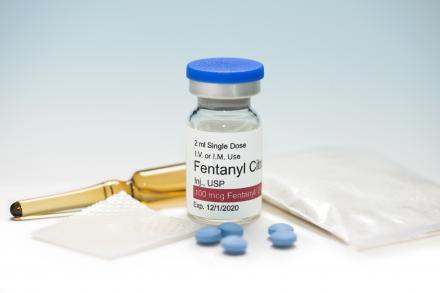In an encouraging display of prowess, the National Drug Law Enforcement Agency (NDLEA) has orchestrated a resounding triumph by dismantling an insidious drug syndicate responsible for the importation and trafficking of a pernicious synthetic narcotic named Fentanyl. This nefarious substance, shrouded in an aura of lethal potency, reigns supreme, surpassing the potency of morphine by an astonishing magnitude of 50 to 100 times. Across the globe, Fentanyl’s notoriety looms ominously, as it remains an infamous accomplice in a surfeit of avoidable fatalities plaguing the realms of illicit drug consumption.
This article endeavors to provide the public with a comprehensive exposé on the malevolent presence of the lethal drug, Fentanyl; it further seeks to unravel the dark secrets surrounding this lethal substance, shedding light on its harrowing potency and the alarming rise in preventable overdose deaths it has wrought upon those ensnared in the web of illicit drug use.
Fentanyl, a synthetic opioid, was initially synthesized by Janssen Pharmaceuticals, a Belgian pharmaceutical company, in the 1960s. Originally intended as a powerful painkiller and anesthetic, its extraordinary potency has made it an attractive option for illegal drug manufacturers seeking to produce a potent and euphoric high.
Illicitly manufactured fentanyl, commonly referred to as “street fentanyl,” has become increasingly prevalent in the illegal drug market. It is often mixed with heroin or sold as counterfeit prescription pills, making it difficult for users to discern its presence. These clandestine labs produce the illicit fentanyl, which is then distributed through illegal drug trafficking networks worldwide.
The introduction of fentanyl into Nigeria marks a concerning development in the country’s drug landscape. This lethal substance, previously absent from Nigerian streets, has already claimed numerous lives globally and poses a significant threat to public health within the country.
Statistics from around the world paint a grim picture of fentanyl’s devastating impact. It has emerged as the primary substance responsible for preventable overdose deaths among illicit drug users. Fentanyl-laced drugs are extremely dangerous, as less than two milligrams of fentanyl can result in an overdose or death. The potency of this drug greatly amplifies the risks associated with its use, increasing the likelihood of fatal overdoses.
According to the CDC, fentanyl caused the deaths of 109,680 people in the US in 2022, almost a six-fold increase over five years and representing a 61.5% increase over the 67,480 total in 2021. According to the report, about two-thirds of all overdose deaths involved the potent synthetic opioid. Although multiple drugs can be reported on one death certificate, fentanyl is often found along with others, according to the Centre for Disease Control (CDC).
The dangers posed by fentanyl cannot be overstated. Its strength and potency far surpass those of traditional opioids, making it exceedingly lethal. It depresses the central nervous system, leading to respiratory distress and potential respiratory failure. The risk of accidental overdose is further exacerbated when fentanyl is unknowingly mixed with other substances or when users underestimate its potency.
Nigeria’s law enforcement agencies, especially the NDLEA, play a crucial role in combating the menace of illicit drugs, including fentanyl. NDLEAs recent success in busting a drug syndicate involved in the importation and trafficking of this deadly drug demonstrates its commitment to protecting public health and ensuring public safety.
Given the lethal nature of fentanyl and its increasing prevalence, it is essential to raise awareness among the general public about its risks. Individuals who value their lives and mental health should steer clear of any association with this deadly substance. Education and prevention initiatives should be implemented to inform communities about the dangers of fentanyl and the potential consequences of its use.
Furthermore, healthcare professionals, law enforcement agencies, and relevant stakeholders should work together to develop strategies to identify and combat the distribution of fentanyl within Nigeria. Enhanced border controls, intelligence sharing, and targeted law enforcement efforts can help curtail the spread of this deadly drug and protect the well-being of Nigerian citizens.
In conclusion, the presence of fentanyl in the Nigerian illicit drug market represents a grave threat to public health and safety. As the NDLEA continues its efforts to dismantle drug syndicates and seize dangerous substances, it is crucial for individuals to be vigilant and avoid any involvement with fentanyl. By staying informed and promoting awareness, we can collectively combat this deadly epidemic and protect the lives and well-being of fellow Nigerians.
Mahmud Isa Yola is the special assistant to the Chairman of NDLEA.


 Health2 days ago
Health2 days ago
 Football1 week ago
Football1 week ago
 Football6 days ago
Football6 days ago
 Football1 week ago
Football1 week ago
 Crime7 days ago
Crime7 days ago
 Football1 week ago
Football1 week ago
 Business1 week ago
Business1 week ago
 Business5 days ago
Business5 days ago
